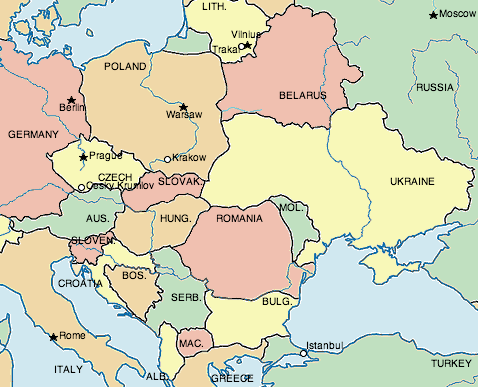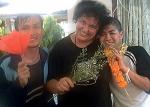Young Czech Prime Minister

The Prime Minister of the Czech Republic, Stanislav Gross, is 32 years old and looks 20! We are realizing how little information we have gotten in the US in the last 15 years about the dynamics in and among Europe and the former communist satellites! “Our new Czech Prime Minister is very clever,” the young waitress says. “He and I went to the same school and we all liked his ideas and his speaking ability.” But I made the catastaphic mistake of calling her country “Czechoslovakia!” “You have made a big mistake, she says,” because we have been the Czech Republic since 1992!”
I have to quote a description out of “History Of The Present” by Timothy Garton Ash…written in the 1994: “The sleeping beauty of Central Europe has not merely been awakened by a prince’s velvet kiss. She has put on black tights and gone off to the disco. While Budapest developed gradually into a modern consumer city starting in the 1970’s, Prague has emerged from its time warp suddenly and explosively. Instead of the magical museum, lovely but decaying, there is color, noise, action: street performers, traffic jams, building works, thousands of young Americans…would-be Hemingways or Scott Fitzgeralds…millions of German tourists, betting shops, reserved parking places for France Telecom and Mitsubishi Corporation, beggars, junkies, Skpenritter of all countries, car alarms, trendy bars, gangsteers, whores galore, Bierstuben, litter, graffiti, video shops and Franz Kafka T-shirts.” We didn’t notice any American kids in this year of 2004…maybe they have moved on to other frontiers…the son of a friend brought one back to the US to marry a few years ago.
Built between the 11th and 18th centuries, the Old Town, the Lesser Town and the New Town speak of the great architectural and cultural influence enjoyed by this city since the Middle Ages. The many magnificent monuments, such as Hradcani Castle, St Vitus Cathedral, Charles Bridge and numerous churches and palaces, built mostly in the 14th century under the Holy Roman Emperor, Charles IV. The historic center of Prague is an UNESCO World Heritage Site.
We took a city walking tour and when I commented to our leader that she knew a lot about the city’s architecture and architecture in general, she shared that yes, she was a civil engineer…but that it wasn’t her first choice because when the new government vetted the former communist members, of which her father was one, she said she was kept, by association, from choosing what she wanted to study in school. (It was common for people to belong to the communist party in order to get a good job, but not believe in it.) She said she would have preferred social science and psychology but she was told she had a choice of civil engineering. Bob thinks there is more to this story but it is a fact that the Czech parliament voted in a “lustration”law, that Vaclav Havel reluctantly signed, to vet all former Communist members. In any case, her husband is an artist and she showed us little noticed public art and memorials…like the small burial plot of a student shot by police in an early resistance demonstration and who is now honored as a hero on each anniversary. We get the feeling there are cautious watchers of this new democracy.Ash says “As is characteristic of most postcommunist countries there is a mixture of enterprise and corruption: large kickbacks paid in the course of privatization, mysterious enhancement of party funds, criminal, semicriminal and corrupt official elements, all combining to give many ordinary people a slightly jaundiced view of both capitalism and the politicians who preach it.”
He has a wonderful chapter on the role of the intellectual now that the velvet revolution has taken place…can an intellectual maintain former President Vaclav Havel’s pre-1989 formula of “living in truth” and still participate in politics effectively? in much of pre-liberation Central Europe–intellectuals have felt themselves called upon to take roles that they not take in the West…being the conscience of the nation…the voice of the oppressed, ..the writer as priest, prophet, resistance fighter and substitute politician. Havel, former playwright and poet, maintains that it is right for independent intellectuals to take an active part in the public life of a democracy…to become a mirror for the government…and also hold office.
But is that possible when as a politician one is required to compete for power and hold office? Havel finds himself in a dilemma. “Through his words and deeds,” Ash says, “Havel preached and practiced a resolute and morally sensitive moderation, civility, tolerance, and decency that contributed to the peaceful civilized nature of the transition from communism in Czechoslovakia” (the “velvet divorce” of the Czech Republic and Slovakia had not happened yet when Ash made his observations.) Vaclav Havel’s speeches have been published in English entitled “Toward A Civil Society.”
Tags: Climbs & Walks, Czech Republic, Europe, Reading, Theft, Travel Tips, UNESCO World Heritage Sites, World Watching And Politics


Leave a Reply